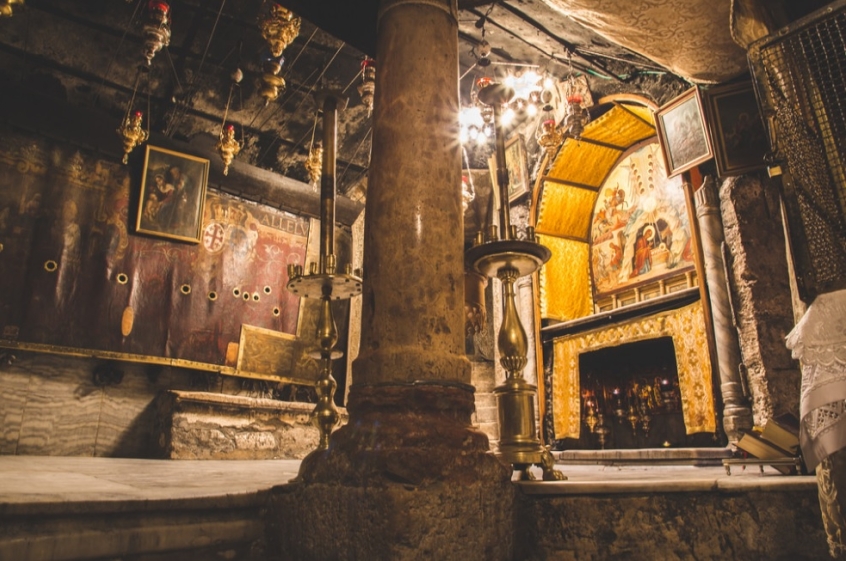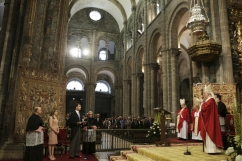
Helena is one of the most influential Christian women of all time. The mother of Roman Emperor Constantine, whose conversion had such a huge effect on Christian history, Helena is a major figure in her own right. Today, Christians around the world remember her.
She gave birth to the future emperor around AD 270. In those first two centuries of the Christian era, the Church was a persecuted minority. Constantine's conversion set in train the process that would leave most of Europe and many other parts of the world as part of 'Christendom'.
Helena was a key part of that process.
Constantine decided to send her to the Holy Land to establish the geographical locations of the Gospel stories and to claim for the newly Christian empire any historic treasures which hadn't gone missing.
In the early 4th century, she founded one of the world's most famous churches – the Church of the Nativity in Bethlehem, which can still be visited today. She is also reputed to have discovered the True Cross – the relics of the cross upon which Jesus was crucified. There, the Church of the Holy Sepulchre was built, reputed to be the site of the resurrection.
Helena was responsible not only for 'discovering' and creating many of the sites in the Holy Land that pilgrims and tourists alike flock to see. She also arguably helped to create the notion of pilgrimage itself – taking years to tour Palestine and Egypt on what she saw as a holy quest.
But what is it that she has bequeathed us, as a Church? Possibly more than anyone else, she emphasised the importance of place and of holy sites to the Christian faith.
But just how important are certain physical places to our faith as Christians?
Christianity inherited from Judaism a keen appreciation for place. The promises of God in the Hebrew Bible were intimately tied to the Land. The ultimate expression of that was the Temple, in Jerusalem, which was the centerpiece not only of worship but also of commercial, civic and cultural life in ancient Israel.
When Jesus was crucified, the curtain of the Temple was torn and by AD70 it had been destroyed along with much of the City of Jerusalem.
But that doesn't mean that Christianity lost its appreciation of holy places.
The Desert Fathers and Mothers found it necessary to retreat from Empire. In the wilderness (which had long been a motif for a meeting place with God in scripture) they created what we now know as monasticism.
As Christianity spread, it gave bishops jurisdiction over a certain geographical area, recognising again that though the Church was universal, it was located in a certain place and would seek to stay in that place.
The Celtic Christians, leaning on the teachings of the Desert Fathers and Mothers, spoke about 'thin places' – often places rich in nature where heaven and earth seemed especially close. Places like Iona and Lindisfarne typify this theme.
As medieval Christian Europe saw vast cathedrals erected to the glory of God, place became ever more significant – with pilgrimages to 'holy sites' beginning. Famous trails developed across Europe and beyond as Christians traipsed hundreds or even thousands of miles to reach Santiago De Compostela in northern Spain, Walsingham in eastern England, or even Jerusalem itself.
The Protestant Reformation meant a drastic reduction in the popularity of these pilgrimages. As the written word became more important in Christian faith, a sense of place was vastly reduced in importance.
Eventually, the more keen Nonconformist groups got rid of the idea of a holy place altogether. Quakers actively resisted the idea that God could be found in a particular building – George Fox referring dismissively to 'steeple houses'.
This influence spread in many other Protestant and low church groups. Church buildings were plain and centred around the pulpit to indicate that the Bible was where we met God, rather than in any particular place (in front of the consecrated Host, as Roman Catholic practice would suggest, for example).
So today, we have the full range of options across the Church. Many Christians find a particular place vital to their spiritual walk, while others pray and worship anywhere. Who is right?
In a sense, it is the wrong question – because we will each approach God in slightly different ways. But it's also worth saying there is scriptural merit both for the belief that the presence of God is strong in certain places and that actually, the earth is the Lord's and everything in it.
The incarnation of Jesus and his life show us that God cares about particular people in particular places at particular times. But if God is the ground of all being, then there really is nowhere we can go to hide from his presence. The key then, isn't arguing over the different ways Christians approach this question – it's to find a place and a type of spiritual practice that enables you and your fellow believers to encounter God.
















